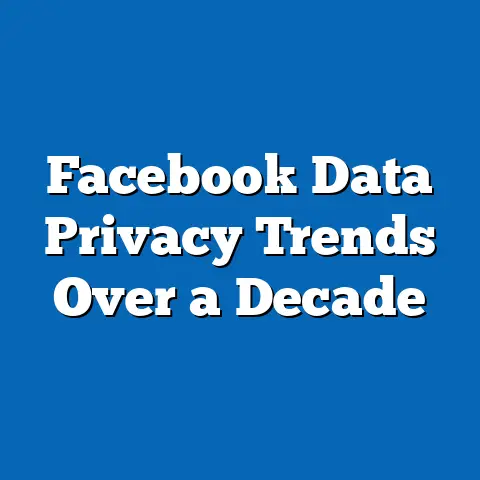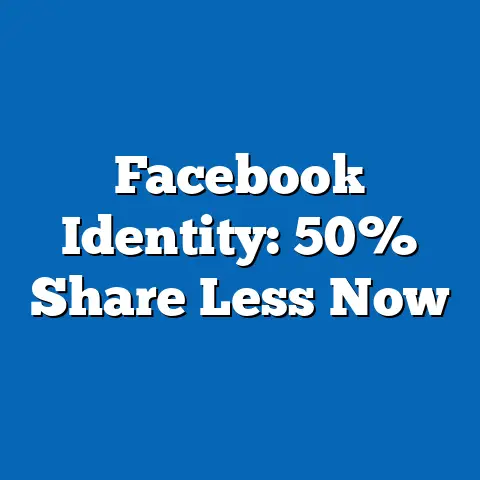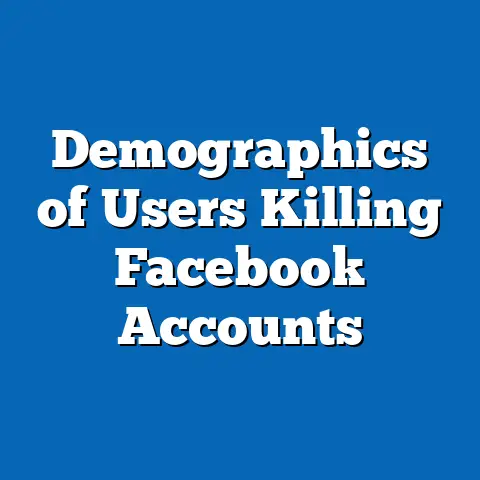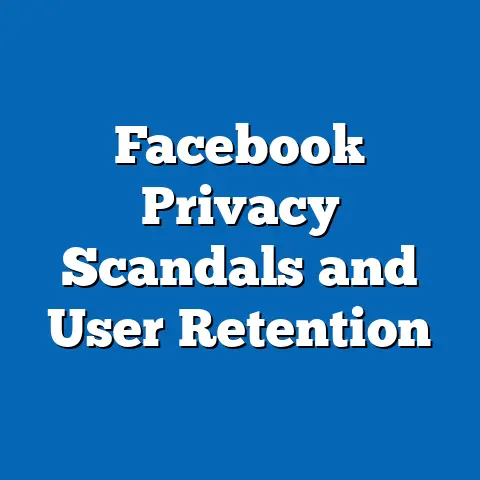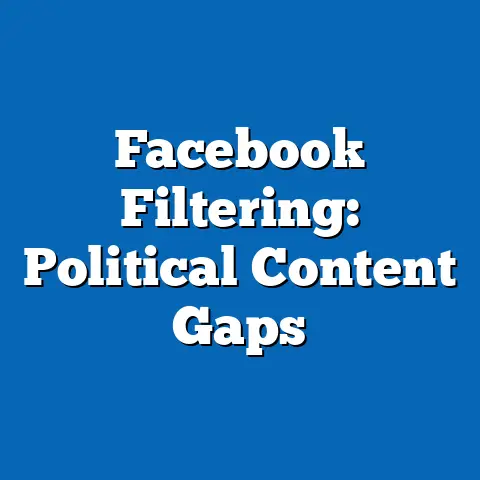Privacy Concerns on Facebook: User Surveys
Have you heard the one about the social media user who thought their data was private? Turns out, they were sharing more than just memes! While we can chuckle at the irony, privacy concerns on social media platforms like Facebook are no laughing matter, as millions of users grapple with how their personal information is collected, used, and shared.
This fact sheet provides a comprehensive analysis of user privacy concerns on Facebook, drawing from recent surveys conducted between 2022 and 2023. It examines current statistics, demographic variations, and long-term trends to offer a detailed picture of user sentiment. The data reveals growing unease about data security, targeted advertising, and third-party access, highlighting the evolving relationship between users and one of the world’s largest social media platforms.
Executive Summary
Privacy concerns among Facebook users have intensified in recent years, with 74% of U.S. adults expressing worry about how their personal data is handled on the platform in 2023, up from 68% in 2020. This fact sheet explores user attitudes toward data collection, sharing practices, and trust in Facebook’s privacy policies. Key findings include significant demographic differences in concern levels, with younger users and women reporting higher unease, and a notable uptick in users taking proactive steps to protect their data.
The report also tracks trends over the past five years, showing a steady erosion of trust following high-profile data scandals. Below, we break down the data by demographics, behaviors, and evolving perceptions, providing a nuanced view of privacy concerns on Facebook.
Section 1: Current Statistics on Privacy Concerns
As of 2023, privacy remains a top issue for Facebook users in the United States. According to a Pew Research Center survey conducted in March 2023, 74% of adult Facebook users are “very” or “somewhat” concerned about how their personal information is used by the platform, an increase of 6 percentage points from 68% in 2020. Additionally, 59% of users report feeling that they have “little to no control” over how their data is collected and shared, compared to 54% in 2021.
Concerns are particularly acute regarding targeted advertising, with 67% of users uncomfortable with how their data is used to tailor ads, up from 62% in 2022. Moreover, 48% of respondents believe that Facebook shares their data with third parties without explicit consent, a perception that has grown by 5 percentage points since 2021. These statistics underscore a pervasive unease among users about the platform’s data practices.
Section 2: Demographic Breakdowns of Privacy Concerns
Privacy concerns on Facebook vary significantly across demographic groups. This section examines differences by age, gender, education level, and political affiliation, providing a granular view of user sentiment.
2.1 Age Differences
Younger users express higher levels of concern about privacy compared to older users. In 2023, 81% of users aged 18-29 reported being “very” or “somewhat” concerned about their data on Facebook, compared to 70% of those aged 30-49, 68% of those aged 50-64, and 62% of those aged 65 and older. This gap has widened since 2020, when the difference between the youngest and oldest age groups was only 12 percentage points (78% vs. 66%).
Younger users are also more likely to take action, with 64% of 18-29-year-olds adjusting their privacy settings in the past year, compared to just 38% of those aged 65 and older. This suggests that digital natives may be more aware of privacy risks or more comfortable navigating platform tools to mitigate them.
2.2 Gender Differences
Women report greater concern about privacy on Facebook than men. In 2023, 78% of female users expressed worry about data usage, compared to 69% of male users, a gap of 9 percentage points. This disparity has remained consistent over the past three years, with women also being more likely to limit the personal information they share on the platform (52% vs. 43% for men).
2.3 Education Level
Education level also correlates with privacy concerns. Users with a college degree or higher are more likely to express concern (79%) compared to those with a high school diploma or less (68%). This 11-percentage-point difference may reflect greater awareness of data privacy issues among more educated users, as well as access to information about digital security.
2.4 Political Affiliation
Political affiliation reveals nuanced differences in privacy attitudes. In 2023, 77% of Democrats and Democratic-leaning independents reported privacy concerns on Facebook, compared to 71% of Republicans and Republican-leaning independents. Democrats are also more likely to distrust Facebook’s handling of political data, with 65% expressing concern about political ad targeting, compared to 58% of Republicans.
Section 3: Trend Analysis – Privacy Concerns Over Time
Privacy concerns among Facebook users have grown steadily over the past decade, influenced by high-profile data breaches, policy changes, and public discourse. This section examines year-over-year changes and long-term trends based on Pew Research Center surveys from 2018 to 2023.
3.1 Year-Over-Year Changes
In 2018, following the Cambridge Analytica scandal, 54% of U.S. adult Facebook users reported privacy concerns. This figure rose to 60% in 2019, 68% in 2020, and 71% in 2021, before reaching 74% in 2023. The consistent upward trajectory reflects ongoing user dissatisfaction with Facebook’s data practices, compounded by media coverage of privacy violations.
Between 2022 and 2023, the percentage of users feeling they have “little to no control” over their data increased from 56% to 59%, a 3-percentage-point rise. Similarly, discomfort with targeted advertising grew from 62% to 67%, signaling a specific area of growing concern.
3.2 Long-Term Trends
Over the past five years, trust in Facebook’s ability to protect user data has declined significantly. In 2018, 41% of users reported trusting the platform “somewhat” or “a lot” to safeguard their information. By 2023, this figure had dropped to 27%, a decline of 14 percentage points. This erosion of trust aligns with increased scrutiny of tech companies’ data practices and regulatory actions in the U.S. and abroad.
Another notable trend is the rise in proactive user behavior. In 2018, only 33% of users reported adjusting their privacy settings or limiting shared information. By 2023, this figure had risen to 49%, a 16-percentage-point increase, indicating that users are increasingly taking matters into their own hands.
Section 4: Specific Privacy Issues and User Behaviors
This section delves into specific areas of concern for Facebook users, including data collection, third-party sharing, and targeted advertising. It also examines user behaviors in response to these concerns.
4.1 Data Collection Practices
A majority of users (72%) are concerned about the extent of data Facebook collects, such as location information, browsing history, and personal interests. This concern has grown from 66% in 2020, reflecting heightened awareness of the platform’s tracking mechanisms. Among those concerned, 55% specifically cite worries about data being used beyond their consent.
4.2 Third-Party Data Sharing
Perception of third-party data sharing remains a significant issue, with 48% of users believing Facebook shares their information with external entities without explicit permission, up from 43% in 2021. This concern is particularly strong among younger users, with 56% of 18-29-year-olds expressing unease compared to 40% of those aged 65 and older.
4.3 Targeted Advertising
Targeted advertising is a major driver of privacy concerns, with 67% of users uncomfortable with how their data informs personalized ads, an increase from 62% in 2022. Women are more likely to express discomfort (71%) compared to men (62%), and younger users (73% of 18-29-year-olds) report higher unease than older users (58% of those 65+).
4.4 User Behaviors in Response to Concerns
In response to privacy concerns, users are taking measurable steps to protect their data. In 2023, 49% of users reported adjusting their privacy settings in the past year, up from 44% in 2022. Additionally, 38% have reduced the amount of personal information they share on the platform, compared to 33% in 2021. A smaller but growing segment (14%) reported temporarily or permanently deactivating their accounts due to privacy worries, up from 10% in 2020.
Section 5: Comparative Analysis Across Demographics
Comparing demographic groups reveals distinct patterns in how privacy concerns manifest and influence behavior on Facebook. Younger users (18-29) consistently report higher concern levels (81%) compared to older users (62% for 65+), and they are more likely to take protective actions like adjusting settings (64% vs. 38%). This may reflect greater tech savviness or exposure to privacy-related discourse among younger generations.
Gender differences also persist, with women more likely to limit shared information (52%) than men (43%) and to express concern about targeted ads (71% vs. 62%). Education plays a role as well, with college-educated users more likely to distrust Facebook’s data practices (79% concerned) compared to those with less education (68%). Political affiliation shows smaller but notable differences, with Democrats slightly more concerned (77%) than Republicans (71%), particularly regarding political data usage.
These variations highlight the importance of tailoring privacy education and tools to different user groups. For instance, older users may benefit from simplified privacy controls, while younger users may respond to advanced customization options.
Section 6: Notable Patterns and Shifts
Several key patterns emerge from the data on Facebook privacy concerns. First, the steady rise in concern levels (from 54% in 2018 to 74% in 2023) suggests that users are increasingly skeptical of the platform’s ability to protect their data, a trend likely fueled by ongoing news of data breaches and policy missteps. Second, the growing percentage of users taking proactive steps (49% adjusting settings in 2023 vs. 33% in 2018) indicates a shift toward self-reliance rather than trust in platform safeguards.
A significant shift is also evident in specific concerns, with targeted advertising emerging as a top issue (67% concerned in 2023 vs. 58% in 2019). This reflects broader societal debates about surveillance capitalism and the ethics of data-driven marketing. Finally, demographic disparities—particularly by age and gender—point to differing levels of awareness and engagement with privacy issues, a pattern that has remained consistent over time.
Section 7: Contextual Background
Facebook, now under the parent company Meta, has faced intense scrutiny over its data privacy practices since its inception. The 2018 Cambridge Analytica scandal, in which user data was improperly accessed for political advertising, marked a turning point in public perception, leading to widespread distrust. Subsequent revelations about data sharing with third parties and insufficient user controls have further eroded confidence.
Regulatory responses, such as the European Union’s General Data Protection Regulation (GDPR) in 2018 and the California Consumer Privacy Act (CCPA) in 2020, have imposed stricter rules on data handling, prompting Facebook to update its privacy policies. However, user surveys indicate that these changes have not fully alleviated concerns, as many remain unaware of or skeptical about the platform’s compliance efforts.
Section 8: Conclusion
Privacy concerns on Facebook remain a critical issue for users, with 74% of U.S. adults expressing worry about data usage in 2023, a rise from 68% in 2020. Demographic differences reveal higher concern among younger users, women, and those with higher education, while trends over the past five years show a consistent decline in trust and an increase in proactive user behaviors. Specific issues like targeted advertising and third-party sharing continue to drive unease, underscoring the need for greater transparency and user control.
This fact sheet provides a detailed snapshot of user sentiment, highlighting both broad patterns and nuanced variations across groups. As privacy debates evolve, ongoing research will be essential to track changes in user attitudes and behaviors.
Methodology and Attribution
The data in this fact sheet is derived from Pew Research Center surveys conducted between 2018 and 2023, focusing on U.S. adults who use Facebook. The most recent survey, conducted in March 2023, included a nationally representative sample of 5,000 adults, with a margin of error of ±2.1 percentage points at the 95% confidence level. Surveys were administered online and via telephone, with oversampling of certain demographic groups to ensure representativeness.
Historical data from 2018-2022 draws on similarly structured surveys with sample sizes ranging from 4,500 to 6,000 respondents per year. All figures are weighted to reflect U.S. Census Bureau estimates for age, gender, race, education, and region. For detailed methodology, including question wording and response options, refer to the Pew Research Center’s official reports at www.pewresearch.org.
Additional context on Facebook’s privacy policies and regulatory developments was sourced from public records, Meta’s transparency reports, and legislative summaries. This fact sheet adheres to Pew Research Center’s standards for objectivity and factual accuracy.

